Good Morning: A While back the NEA asked several arts “practitioners” to write essays in response to the Endowment’s latest arts participation study which came out last year. We’ve featured a couple of them so far — National Book Foundation director Ruth Dickey’s musings on declines in reading — less than half of American adults report reading even one book last year, yet one billion books were sold. And arts consultant Peter Linett’s questions about what audiences are being measured. My contribution was an essay pondering how relationships between artists and audiences have changed and the definitions of creativity in the digital age have evolved. Reactions? Email me at mclennan@artsjournal.com
Here are today’s highlights:
- New AI Video Generators Could Change How Movies Are Made
Meta’s new AI video generator technology could transform filmmaking by allowing directors to produce visual content instantly. However, there are concerns about displacing digital artists and the potential for generating disinformation. Read more on The New York Times. - Kansas City’s Public Radio Stations Cut Jobs and Classical Programming
NPR outlet KCUR and its sister station Classical KC are cutting jobs and pausing local classical music programming due to financial pressures. This decision reflects broader challenges in public radio, as stations struggle to balance local content with national programming. Read more on Current. - Star Cast of Classical Musicians Gather to Say Goodbye to Legendary Producer
A who’s who of classical musicians, including Joshua Bell and Simone Dinnerstein, gathered at the home of legendary producer Adam Abeshouse to bid him farewell. Abeshouse, a beloved figure in the classical music world, is in the final stages of a terminal illness. Read more on NPR. - Scotland’s Arts Funder Struggles with Budget Uncertainty
Creative Scotland has delayed announcing new arts funding due to uncertainty about its budget, which is contingent on the UK’s broader fiscal policies. This delay is causing stress among artists and cultural institutions reliant on government support. Read more on BBC. - Less Than Half of American Adults Read a Book Last Year, But Sales Remain Strong
According to a new NEA report, fewer than half of American adults read a book in the past year, reflecting a troubling decline in reading for pleasure. However, book sales remain robust, indicating that the market is being driven by fewer, more dedicated readers. Read more on The Guardian.
The rest of our stories are below. Have a great weekend.
Doug

